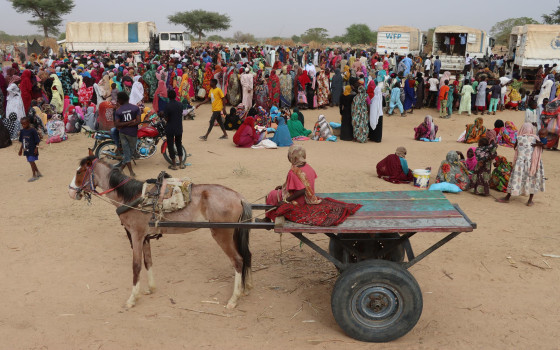
Sudan: Women Raped and Abducted in the Midst of War... Cholera Response Expanded... 40 Civilians Killed in Attack on Hospital in West Kordofan

- Europe and Arabs
- Wednesday , 25 June 2025 11:8 AM GMT
Khartoum - Geneva: Europe and the Arabs
At the heart of the world's largest displacement crisis, Sudanese women are on the front lines, not only as survivors but also as leaders and influencers, continuing to provide life-saving services amid a dire reality of alarmingly high rates of sexual violence and abuse against women and girls. According to the UN's daily news bulletin, "As the conflict in Sudan enters its third year, the war continues to devastate large parts of the country. The clashes have led to the world's largest displacement crisis, with more than 12 million people forced to leave their homes, with children and women bearing the brunt of this catastrophe."
On the International Day for the Elimination of Sexual Violence in Conflict, marked annually by the UN on June 19, UN News in Geneva spoke with Marwa, a representative of one such organization that works closely with local women's groups in Sudan, with support from the UN Women's Peace and Humanitarian Fund.
Marwa revealed heartbreaking stories of girls being abducted, sexual violence affecting all ages, and how women at the grassroots level are demonstrating resilience and trying to influence the peace process.
Marwa described the situation in Sudan as an "unprecedented context," with women and girls facing immense suffering, noting the displacement and separation of families and the loss of all their possessions.
She explained, "For example, the majority of women used to work in factories or sell food on the streets." This women's sector has suffered huge losses due to the war, which has destroyed infrastructure, halted industry, transportation, agriculture, and all livelihood activities. People have lost all their sources of income, but this impact has been most severe on women and girls, who have been disproportionately affected by the conflict. They are the ones bearing the brunt of the war, trying to keep their families together and provide food for themselves and their communities. She explained that the escalation of gender-based violence has significantly affected them. She continued, "Sexual violence has increased dramatically, and women are now suffering from trauma and stigma. There are also crimes because of it. Recently, we have had some cases of girls being kidnapped. Many girls have been abducted without any mechanism to track or recover them. This is happening now in Sudan."
In the same context, UN spokesman Stéphane Dujarric expressed deep concern over reports of a deadly attack on a hospital in the town of Al-Mujlad, West Kordofan State, earlier this week.
In his daily press conference, Dujarric said that, according to the World Health Organization, the attack on Al-Mujlad Hospital killed more than 40 civilians, including children and health workers, and injured dozens. The hospital also sustained significant damage.
He added: "We have consistently condemned all attacks on health care facilities and personnel, particularly in conflict zones, where access to the injured may be difficult, if not impossible. Parties must respect the special protection afforded to health care workers under international humanitarian law. The rules of war require the protection of the wounded and sick, as well as medical personnel in hospitals, at all times.
He explained that the attack on the hospital comes at a time when nearly three-quarters of health facilities in the areas most affected by the conflict, including in the Kordofan region, are either poorly functioning or completely closed. Meanwhile, health and humanitarian partners are under tremendous pressure and underfunded as they try to curb the spread of diseases, including measles and cholera.
Scaling up the cholera response
Despite the challenges, the UN spokesperson reported that the number of new suspected cholera cases has declined significantly in recent weeks. Between June 16 and 22, 207 new suspected cases were reported, compared to more than 8,400 cases between May 19 and 25, according to the Sudanese Ministry of Health.
The UN Office for the Coordination of Humanitarian Affairs (OCHA) reported that it and UN partners in the health, water, sanitation, and hygiene sectors are scaling up the response. He explained that more than 3 million doses of oral cholera vaccine have been delivered. To Khartoum and North Kordofan, vaccination campaigns have already begun. Another 3 million doses are expected to arrive soon.
The office said that so far, partners have provided emergency water and sanitation services to 2.3 million people, while hygiene promotion efforts have supported 1.3 million people.
However, it warned that aid organizations are now running out of pre-positioned supplies due to the early onset of the outbreak, which was driven by attacks on infrastructure as well as disruptions to power and water supplies.
The office stressed the urgent need for flexible funding to support and scale up the response, especially as fears of a renewed cholera outbreak mount starting in July and August with the return of the rainy season and the potential for flooding.












No Comments Found